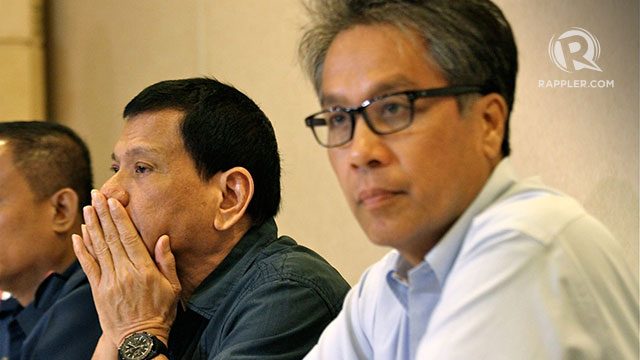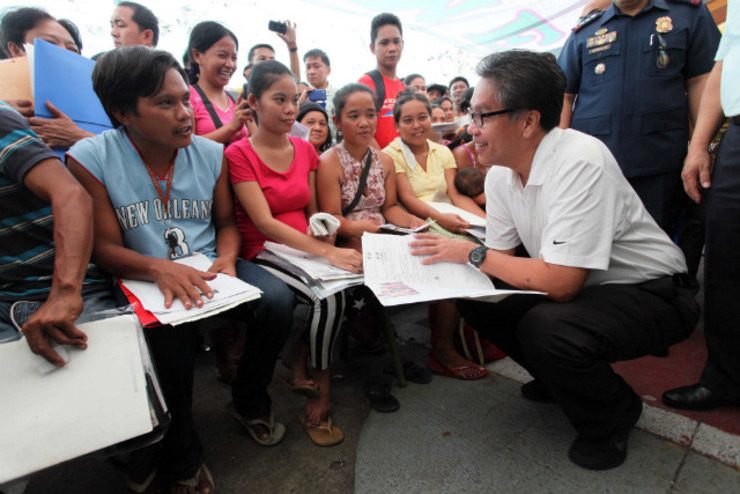SUMMARY
This is AI generated summarization, which may have errors. For context, always refer to the full article.
MANILA, Philippines – Members of the Senate minority on Monday, November 24, questioned why several government projects seemingly beyond the mandate of the Department of the Interior and Local Government (DILG) were listed in its proposed budget for 2015.

For close to 3 hours Monday evening, members of the Senate minority – particularly senators Nancy Binay and Ferdinand Marcos Jr – focused on the following DILG’s programs:
- Performance Challenge Fund for LGUs
- Grassroots Participatory Budgeting Process (GPBP)
- PAyapa at MAsaganang PamayaNAn (Pamana Fund)
- Sagana at Ligtas na Tubig sa Lahat Program (SALIN Tubig)
While Binay zoomed in on the allegedly “unequal” distribution of money under the GBPB, Marcos questioned why water supply and housing projects were under the DILG when they would be better assigned to the Public Works and Highways Department of the National Housing Authority (NHA).
Deliberations for the DILG’s proposed budget ended shortly before 10 pm on Monday. Senator Francis Escudero, chairman of the Senate finance committee, officially closed the period of interpellation and conditionally approved the budget pending some documents from the DILG and the Philippine National Police (PNP).
The DILG has a P104.571-billion proposed budget for 2015. Of the sum, over P12 billion come in “lump sums,” according to Marcos.
Skewed programs?
Binay, who was first to speak in the DILG budget’s period of interpellation and debate, said the GPBP seemed to be biased for certain provinces and municipalities.
The GPBP is designed to allow local government units (LGUs) to decide on projects in their areas after consultation with communities and civil society organizations.
Under the GPBP, LGUs listed down their priority projects and are given a budget of P15 million each. While before, 1,200 LGUs shared the P20-billion under the GPBP, there are now 1,600 that share it.
Binay, daughter of embattled Vice President Jejomar Binay, singled out the province of Batanes for receiving a higher per capita allocation from the GBPB compared to bigger and poorer provinces.
Batanes is the home province of Budget Secretary Florencio Abad, stalwart of the ruling Liberal Party (LP) and a close ally of DILG Secretary Manuel Roxas II.
The neophyte senator stopped short of saying the DILG was using the GBPB to favor his political allies. Earlier, Senator Miriam Defensor Santiago hinted that the DILG was remiss in its priorities.
LGUs vying for a piece of the GBPB pie have to first submit a list of priority projects based on a “menu” pre-approved by the national government.
But even before that, they must first get a “seal of good governance” from the DILG.
Binay remarked the GPBP wasn’t staying true to its goal. “Parang hindi rin niya nakukuha ‘yung equal distribution of money,” said Binay. (It seems to me that the GBPB is unable to achieve its goal of equal distribution of money.)
Pamana is designed “to enable communities affected by and vulnerable to armed conflict to return to peaceful conditions” and “as the national government’s focused development program for isolated, hard-to-read, conflict-affected/conflict-vulnerable communities.”
Marcos later criticized the GBPB as one of national government’s “alternative” but “restrictive and conditional” budget sources.
He said another DILG program seemed to be implemented arbitrarily was the Pamana Fund, which was introduced during the Aquino administration.
“I personally think some areas are not conflict-affected,” Marcos remarked during his interpellation.
The DILG, through Escudero, explained the areas covered by Pamana were determined through the LGUs themselves, the country’s security sector, and reports from the military and police.
Some 34 provinces, 96 cities and towns, and 2 highly-urbanized cities are beneficiaries of the Pamana fund.
DILG’s core competencies?
Marcos, who spent the most time interpellating the DILG budget, also questioned why the department was appointed the lead agency for projects such as the Illegal Settler Families (ISF) relocation program in the National Capital Region, as well as the SALIN Tubig program.
ISF relocation, said Marcos, should be the role of the National Housing Authority or the DPWH. Salin Tubig, he said, should also be under the DPWH, which has the existing expertise.
Salin Tubig is allocated over P1.27 billion in the proposed budget, while Pamana is getting P3.143 billion.

“Makasisiguro po ang ating butihing senador na hindi nagpapabaya at walang pinipili sa paglilingkod ang DILG.”
– DILG Sec Mar Roxas
The DILG explained the ISF relocation was assigned to DILG under Roxas by the President himself, as part of national government’s Metro Manila flood control program.
Roxas, through Escudero, explained that based on their experience, LGUs don’t allocate funds to house evicted informal settlers. “The solution was to make DILG the lead,” said Escudero.
It’s not the first time for the Senate minority to question the DILG’s role in relocating ISFs. Binay also questioned this program during the 2014 budget deliberations.
Salin Tubig, a project launched in 2011, was initially offered to DPWH chief Rogelio Singson, according to Roxas.
But since most of the projects under Salin Tubig are “level 1” or small-scale water projects, the DPWH begged off from its implementation. The DPWH typically handles “level 3” or “level 2” water projects.
“Salin Tubig covers level 1 so it was decided that it’s better that LGUs implement,” said Escudero.
In a statement released after his interpellation, Marcos seemed to remain unconvinced. “Instead of managing water supply projects or build houses, the DILG secretary instead should focus on improving the peace and order situation and homeland security,” Marcos said.
In a statement released Tuesday, November 25, Roxas said “despite attempts made by some sectors” to put political color to the DILG’s projects, “it has always strived to fulfill its mandate.” Roxas was referring to Santiago’s earlier statements.
“Makasisiguro po ang ating butihing senador na hindi nagpapabaya at walang pinipili sa paglilingkod ang DILG (The senator can be sure that DILG is neither negligent nor biased in fulfilling its duties),” said Roxas. – Rappler.com
Add a comment
How does this make you feel?
There are no comments yet. Add your comment to start the conversation.